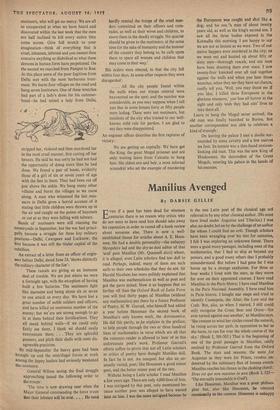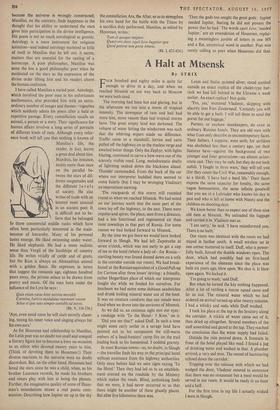Manilius Avenged
By DARSIE GILLIE VEN if a poet has been dead for nineteen Ecenturies there is no reason why critics who do not seem to have read him should take away his reputation in order to round off a book review about someone else. There is now a well- established theme for articles about A. E. Hous- man. He had a double personality—the unhappy Shropshire lad and the dry-as-dust editor of that `arid' poet Manilius (Mr. Quennell dixit) whom, it is alleged, even Latin scholars find too dull to read. Perhaps, indeed, many of them are such serfs to their own schedules that they do not. Sir Harold Nicolson has more politely explained that Manilius was mathematician as well as poet and got the parts mixed. Now it so happens that no farther off than the Oxford Book of Latin Verse you will find thirty pages of Manilius (without any mathematics) put there by a future Professor of Poetry, H. W. Garrod, who himself had edited a year before Housman the second book of Manilius's only known work, the Astronomica. He did this partly, as „he explains in the preface, to help people through the two or three hundred lines of mathematics in verse which are all that the common reader is allowed to hear of in this unfortunate poet's work. Professor Garrod's efforts suffice to prove that not all Latin scholars or critics of poetry have thought Manilius dull. In fact he is not. An unequal, but also an un- usually varied, poet; like Housman a good minor poet, and the better minor poet of the two.
Without being a Latin scholar I read Manilius a few years ago. There are only 4,000 lines of him. I was intrigued by this poet, only mentioned be- cause another poet was alleged to have wasted time on him. 1 was the more intrigued because he is the one Latin poet of the classical age not referred to by any other classical author. (He must have lived under Augustus and Tiberius.) I was also, no doubt, led on by the challenge of an author for whom I could find no crib. Though scholars have been wrangling over his text for centuries, I felt I was exploring an unknown forest. Thera were a good many passages, including most of the mathematics, that I had to skip as beyond my powers, and a good many others that I probably misunderstood. But before I had gone far I was borne up by a strange exaltation. For three or four weeks I lived with the stars, as they move for ever on their appointed courses. I have read Manilius in the Paris Metro; I have read Manilius in the Paris National Assembly. I have read him in Paris bistros. I bought star maps and tried to identify Cassiopeia, the Altar, the Lyre and the Crab. But, alas, as when I started, I still could only recognise the Great Bear and Orlon—`for ever turned against one another,' as Manilius says. 'She content to wind her circles round the summit, he rising across her path, in opposition to her as she turns, to run for ever the whole course of the sky.' (Book I, 501-505.) That is the beginning of one of the great passages in Manilius, oddly omitted by Professor Garrod from the Oxford Book. The stars and seasons, the same for Augustus as they were for Priam, revolve un- deterred by the sublunary flux of human events. Manilius reaches his climax in the clashing chord: Deus est qui non mutatur in trvo (Book 1, 525— 'The eternally immutable is God').
Like Housman, Manilius was a poor philoso- pher but, also like Housman, he vibrated emotionally to the cosmos. Housman is unhappy because the universe is wrongly constructed; Manilius, on the contrary, finds happiness in the thought that his ability to understand the stars gives him participation in the divine intelligence. His poem is not so much astrological as gnostic. Astrology is a mere instrument for religious initiation—and indeed astrology mattered so little of itself to Manilius that he left out, it seems, matters that are essential for the casting of a horoscope. A poor philosopher, Manilius was none the less a good philosophic poet when he meditated on the stars as the expression of the divine order lifting him and his readers above the human confusion.
I have called Manilius a varied poet. Astrology, which involved the poor man in his unfortunate mathematics, also provided him with an extra- ordinary number of images and themes—vignettes which suddenly adorn his poem after a bald or repetitive passage. Every constellation recalls an animal, a person or a story. Their significance for human affairs involves a long series of portraits of different kinds of men. Although every refer- ence book will tell you that nothing is known of
Quin etiam curas inter secreta movebit Carmina, furtivo modulatus inurnittre vixen Solus et ipse suns sewer cantabit ad aures.
(Bk. V, 334-336.) 'Aye, even amid cares he will start secretly chant- ing, tuning his inner voice and singing always for his own ears.'
As for Housman and relationship to Manilius, the Latin poet was no doubt too small and unequal a literary figure not to become a bore on occasion to an editor who devoted twenty years to him. (Think of devoting them to Housman!) Their diverse reactions to the universe were no doubt discordant. But, on the other hand, Housman had loved the stars since he was a child, when, as his brother Laurence records, he made his brothers and sisters play with him at being the planets. Further, the imaginative quality of some of Hous- man's emendations shows a real poetic com- munion. Describing how Jupiter set up in the sky the constellation Ara, the Altar, so as to strengthen his own hand for the battle with the Titans by a sacrifice duly performed, Manilius, as edited by Housman, writes : Turn di quoque magnos Qua'sivere deos: eguit Jove Juppiter ipse
Quod poterat non posse :linens.
(Bk. 1, 422-424.) 'Then the gods too sought the great gods : Jupiter needed Jupiter, fearing he did not possess the power that he had.' The words eguit Jove, 'needed Jupiter,' are an emendation of Housman, replac- ing a meaningless jumble of letters in one MS and a flat, unmetrical word in another. Poet was surely calling to poet when Housman did that.































 Previous page
Previous page